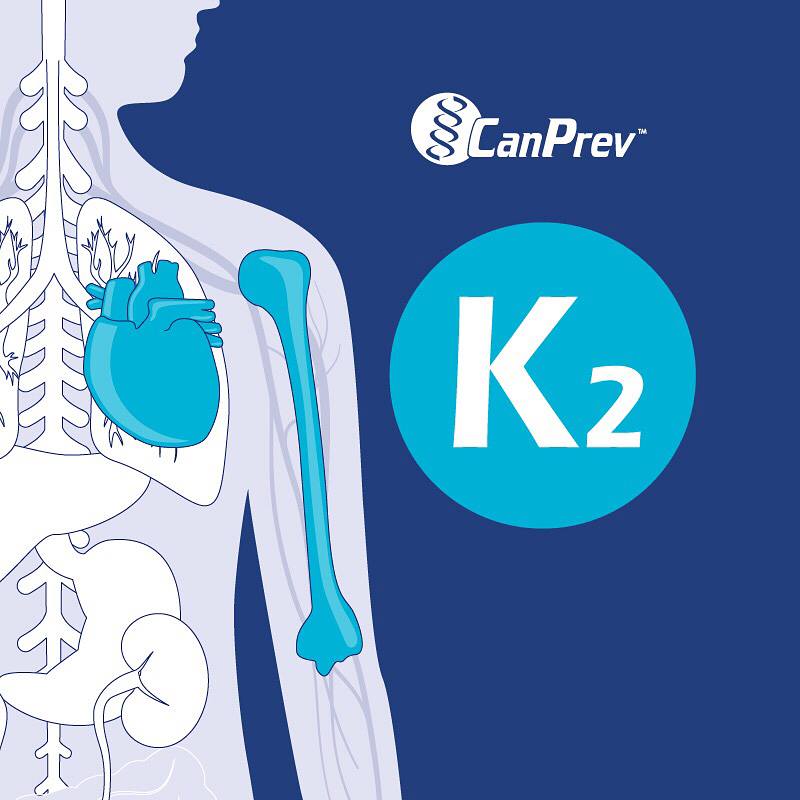In Nutrient Spotlight: The Science Behind Vitamin K2, we covered the discovery of the Vitamin K family, its overall function in the body, and brief differences between MK-4 and MK-7. Now, let’s dive deeper into how vitamin K1 differs from K2, why deficiency is hard to detect, and why this nutrient is so essential to our health.
Vitamin K2 has a different biological role than K1
Vitamin K2 has a wide range of biological roles, including preventing calcium from depositing into soft tissues like the kidneys and arteries. At the same time, it helps transport that calcium into bones and teeth, improving bone density and dental health. Studies have linked low levels of vitamin K2, especially MK-7, with a higher incidence of fractures.
Vitamin K1 doesn’t offer these cardiovascular and bone benefits. While K1 is primarily used for blood coagulation, K2 has a small role in it. This is the main difference between K1 and K2.
K1 and K2 are not in the same foods
Vitamin K1 (phylloquinone) is mainly in the leaves of plants because it plays a role in photosynthesis. Its name reflects that; “phyllo” means “leaves” in Greek. K1 is abundant in leafy greens, such as broccoli, kale, and spinach. For this reason, K1 is easy to obtain from dietary sources. In fact, vitamin K1 represents 90% of our total dietary intake of K vitamins.
In contrast, vitamin K2 (menaquinone) is mostly from microbial origin. The MK-7 form is in fermented cheese and yogurt, and is
abundant in the Japanese dish of fermented soybeans called natto. Meat, dairy, and eggs have the MK-4 form of vitamin K2. Unfortunately, due to industrial farming, animal sources aren’t great sources of vitamin K2. Evidently, nearly everyone has nutrient deficiencies.
Why are there no signs of vitamin K2 deficiency?
Unlike vitamin K1, it’s possible to have a vitamin K2 deficiency and not experience symptoms until it’s too late. As vitamin K2 is heavily involved in cardiovascular and bone health, which are considered silent diseases, signs of K2 deficiency often remain undetected. Plaque buildup in arteries and decreased bone density may take several years before symptoms arise.
Dr. Bruce Ames, a professor of molecular biology at the University of California, theorized the triage allocation. According to this theory, during times of shortages, micronutrients aid in urgent short-term survival at the expense of sustaining long-term health. In the case of vitamin K deficiencies, the body allocates the little amount it has to support important liver enzymes for blood clotting instead of bone building functions.
Vitamin K2’s roles in the body
Bone health: K2 activates matrix Gla protein (MGP), which is responsible for transporting dietary calcium into bone. K2 also activates osteocalcin, which forms collagen fibril bands to improve fracture resistance. With vitamin D3, these two vitamins help keep bones strong.
Cardiovascular health: K2 activates MGP in blood, inhibiting calcification of arteries and other soft tissues.
Dental health: Like our bones, teeth also require K2 to support mineralization. K2 activates osteocalcin, which incorporates calcium in teeth.
Child and adolescent growth: During these periods of intense skeletal growth, peak bone mass is achieved around the age of 20. Studies have shown that supplementing with vitamin K during childhood years can significantly impact bone mineral density.
Pregnancy: Pregnant women can become calcium deficient due to skeletal remodelling to prepare for birth. Necessary for both mother and fetus, K2 supports infant skeletal development and improves the bone health of mom.
Athletic performance: K2 affects blood sugar metabolism and the
cardiovascular system, thereby impacting athletic performance. A study showed increased maximal cardiac output with daily supplementation of MK-7.
Male fertility: Osteocalcin, activated by K2, is released from bone to upregulate the synthesis of enzymes required to create testosterone. In this way, K2 supports male fertility.
Kidney health: K2 is a key factor in controlling calcification in arteries and veins. This condition is a common risk factor for those suffering from chronic kidney disease (CKD). Vitamin K supplementation in conjunction with vitamin D reduces atherosclerosis progression in patients with CKD more than vitamin D alone.
Brain health: K2 paired with MGP helps prevent strokes due to their calcification-inhibiting effects.
Skin and aging: Vitamin K2 plays a role in protecting skin elasticity. Similar to preventing calcification in soft tissues, K2 prevents calcification of elastin in skin. Elastin is the protein that gives skin its elasticity and smooths out lines and wrinkles.
There’s more!
These are just some of the benefits that vitamin K2 offers. It also plays various roles in inflammation, blood sugar balance, prostate health, and more. It turns out that this vitamin is more mighty than we originally thought. And we’re still discovering more about it!
Now that you’ve learned a little about why vitamin K2 is important for good health, you may consider adding this supplement to your regimen. For those looking to increase mineral intake and absorption, or are at risk of developing health conditions related to mineral deficiency, speak with your natural healthcare provider to discuss the supplements that may be right for you.







Great article, totally what I needed.